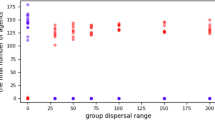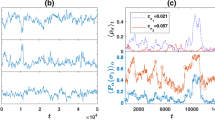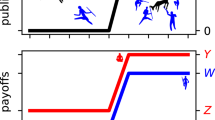Abstract
One of the greatest challenges in the modern biological and social sciences is to understand the evolution of cooperative behaviour. General outlines of the answer to this puzzle are currently emerging as a result of developments in the theories of kin selection1,2,3,4,5,6,7, reciprocity8,9,10, multilevel selection11,12,13,14,15 and cultural group selection16,17. The main conceptual tool used in probing the logical coherence of proposed explanations has been game theory, including both analytical models and agent-based simulations6,7,9,18,19,20,21,22,23,24. The game-theoretic approach yields clear-cut results but assumes, as a rule, a simple structure of payoffs and a small set of possible strategies. Here we propose a more stringent test of the theory by developing a computer model with a considerably extended spectrum of possible strategies. In our model, agents are endowed with a limited set of receptors, a set of elementary actions and a neural net in between. Behavioural strategies are not predetermined; instead, the process of evolution constructs and reconstructs them from elementary actions. Two new strategies of cooperative attack and defence emerge in simulations, as well as the well-known dove, hawk and bourgeois strategies. Our results indicate that cooperative strategies can evolve even under such minimalist assumptions, provided that agents are capable of perceiving heritable external markers of other agents.
This is a preview of subscription content, access via your institution
Access options
Subscribe to this journal
Receive 51 print issues and online access
$199.00 per year
only $3.90 per issue
Buy this article
- Purchase on Springer Link
- Instant access to full article PDF
Prices may be subject to local taxes which are calculated during checkout



Similar content being viewed by others
References
Hamilton, W. D. The genetical evolution of social behaviour. I and II. J. Theor. Biol. 7, 1–52 (1964)
Maynard Smith, J. Kin selection and group selection. Nature 201, 1145–1147 (1964)
Michod, R. E. & Abugov, R. Adaptive topography in family-structured models of kin selection. Science 210, 667–669 (1980)
Lacy, R. C. & Sherman, P. W. Kin recognition by phenotype matching. Am. Nat. 121, 489–512 (1983)
Queller, D. C. A general model for kin selection. Evolution 46, 376–380 (1992)
Riolo, R. L., Cohen, M. D. & Axelrod, R. Evolution of cooperation without reciprocity. Nature 414, 441–443 (2001)
Axelrod, R., Hammond, R. A. & Grafen, A. Altruism via kin-selection strategies that rely on arbitrary tags with which they coevolve. Evolution 58, 1833–1838 (2004)
Trivers, R. The evolution of reciprocal altruism. Q. Rev. Biol. 46, 35–57 (1971)
Nowak, M. A. & Sigmund, K. Evolution of indirect reciprocity by image scoring. Nature 393, 573–577 (1998)
Bowles, S. & Gintis, H. The evolution of strong reciprocity: cooperation in heterogeneous populations. Theor. Popul. Biol. 65, 17–28 (2004)
Sober, E. & Wilson, D. S. Unto Others: The Evolution and Psychology of Unselfish Behavior (Harvard Univ. Press, Cambridge, Massachusetts, 1998)
Wilson, D. S. Altruism and organism: disentangling the themes of multilevel selection theory. Am. Nat. 150 (suppl.), 122–134 (1997)
Gintis, H. Strong reciprocity and human sociality. J. Theor. Biol. 206, 169–179 (2000)
Bowles, S. in Social Dynamics (eds Durlauf, S. N. & Young, H. P.) 155–190 (MIT Press, Cambridge, Massachusetts, 2001)
Turchin, P. Historical Dynamics: Why States Rise and Fall (Princeton Univ. Press, Princeton, New Jersey, 2003)
Boyd, R. & Richerson, P. J. Culture and the Evolutionary Process (Univ. Chicago Press, Chicago, Illinois, 1985)
Richerson, P. J. & Boyd, R. in Indoctrinability, Ideology, and Warfare (eds Eibl-Eibesfeldt, I. & Salter, F. K.) 71–95 (Berghahn, New York, 1998)
Axelrod, R. & Hamilton, W. D. The evolution of cooperation. Science 211, 1390–1396 (1981)
Axelrod, R. The Complexity of Cooperation: Agent-based Models of Competition and Collaboration (Princeton Univ. Press, Princeton, New Jersey, 1997)
Epstein, J. M. & Axtell, R. Growing Artificial Societies: Social Science from the Bottom Up (Brookings Institution Press, Washington DC, 1996)
Nowak, M. A. & May, R. M. Evolutionary games and spatial chaos. Nature 359, 826–829 (1992)
McNamara, J. M., Barta, Z. & Houston, A. I. Variation in behavior promotes cooperation in the Prisoner's Dilemma game. Nature 428, 745–748 (2004)
Nowak, M., Sasaki, A., Taylor, C. & Fudenberg, D. Emergence of cooperation and evolutionary stability in finite populations. Nature 428, 646–650 (2004)
Hauert, C. & Doebeli, M. Spatial structure often inhibits the evolution of cooperation in the snowdrift game. Nature 428, 643–646 (2004)
Maynard Smith, J. The theory of games and the evolution of animal conflicts. J. Theor. Biol. 47, 209–222 (1974)
Grafen, A. The logic of divisively asymmetric contests: respect for ownership and the desperado effect. Anim. Behav. 35, 462–467 (1987)
Matthiopoulos, J., Moss, R. & Lambin, X. The kin facilitation hypothesis for red grouse population cycles: territorial dynamics of the family cluster. Ecol. Model. 147, 291–307 (2002)
Maher, C. R. & Lott, D. F. A review of ecological determinants of territoriality within vertebrate species. Am. Midl. Nat. 143, 1–29 (2000)
Burtsev, M. S. Tracking the trajectories of evolution. Artif. Life 10, 397–411 (2004)
Acknowledgements
We thank P. Taylor, H. Gintis and C. Cioffi-Revilla for comments on the manuscript. M.B. was supported by the Russian Fund for Basic Research. P.T. was supported by the NSF.
Author information
Authors and Affiliations
Corresponding author
Ethics declarations
Competing interests
Reprints and permissions information is available at npg.nature.com/reprintsandpermissions. The authors declare no competing financial interests.
Rights and permissions
About this article
Cite this article
Burtsev, M., Turchin, P. Evolution of cooperative strategies from first principles. Nature 440, 1041–1044 (2006). https://doi.org/10.1038/nature04470
Received:
Accepted:
Published:
Issue Date:
DOI: https://doi.org/10.1038/nature04470
This article is cited by
-
Human group coordination in a sensorimotor task with neuron-like decision-making
Scientific Reports (2020)
-
On the role of collective sensing and evolution in group formation
Swarm Intelligence (2018)
-
Big Historical Foundations for Deep Future Speculations: Cosmic Evolution, Atechnogenesis, and Technocultural Civilization
Foundations of Science (2017)
-
Origin of the Directed Movement of Protocells in the Early Stages of the Evolution of Life
Origins of Life and Evolution of Biospheres (2012)
Comments
By submitting a comment you agree to abide by our Terms and Community Guidelines. If you find something abusive or that does not comply with our terms or guidelines please flag it as inappropriate.



